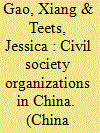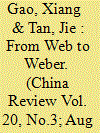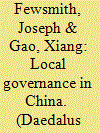|
|
|
Sort Order |
|
|
|
Items / Page
|
|
|
|
|
|
|
| Srl | Item |
| 1 |
ID:
178172


|
|
|
|
|
| Summary/Abstract |
This article examines how civil society organizations navigate local government to secure more inclusive environmental governance. Based on an in-depth case study of water governance in Zhejiang Province between 2012 and 2018, we find that Green Zhejiang, a civil society organization, exercised informal power to hold the local government accountable based on two strategies: mobilizing citizens to collect information on water pollution and strategically leveraging the authority of provincial government to find citizen-focused solutions. Most existing studies foreground one stage of the policy process – advocacy in the agenda-setting phase, policy entrepreneurship during the design phase, or monitoring during the implementation phase; however, we examine strategies of civil society organizations throughout this policy lifecycle. With this approach, we are able to analyse the strategic interactions between different levels of the government and civil society organizations and locate the positive outcomes and limits under the current governance system. Despite policy successes, Green Zhejiang still acts informally, which limits long-term effectiveness. However, incorporating citizens into public administration in a meaningful way requires sharing policymaking power formally, and thus far, local governments are only willing to share power in an ad hoc and informal way. More institutionalized citizen participation is necessary to develop innovative solutions to the severe environmental degradation in China.
|
|
|
|
|
|
|
|
|
|
|
|
|
|
|
|
| 2 |
ID:
136267


|
|
|
|
|
| Summary/Abstract |
Current province-level administrative division in China breaks the distribution of local culture and many cities are separated from their respective local culture regions to locate in other provinces. These cities encounter potential cultural conflicts with the mainstream culture of the provinces they belong to, but also face various local protectionism barriers with cities in the neighboring province that share the same border and local culture with them. As a result, transaction costs could be higher whichever side they trade with, leading to potential harm to their economic development. Using dialect as a proxy for local culture, we find that the cultural segmentation caused by the misalignment between cultural and administrative borders can significantly hamper economic development of the segmented cities. This negative effect is aggravated by greater local protectionism in neighboring provinces but alleviated by a longer history of being administrated by the same province with the current provincial capital. These findings support the hypothesis that cultural and administrative border misalignment works together with local protectionism to bring about substantial economic loss. The results thus highlight the importance of both formal and informal institutions in affecting transaction costs and economic growth, and also shed light on the potential interactions between the two types of institutions.
|
|
|
|
|
|
|
|
|
|
|
|
|
|
|
|
| 3 |
ID:
174400


|
|
|
|
|
| Summary/Abstract |
This article argues that the state-society relations in China's digital era are shaped not only by the communication between the citizens and governments but also by the interactions among different levels of governments. Without formal power to keep the government in check, citizens may gain a louder voice through ICTs, yet exert a limited impact on policymaking. Based on a review of policy documents and an in-depth case study of the "One-Go at Most" reform in Zhejiang province, this research argues that the intervention of upper-level governments changes how the citizens and governments interact at the local level. First, the provincial party-government conducts online citizen surveys to collect information on the local governments, aiming to ensure the full implementation of the reform agenda. This strategy also equips the citizens with informal power, which forces the municipal and county governments to be more responsive and accountable with regard to efficient service delivery. Second, the provincial government has initiated the virtual government program to consolidate the new administrative procedures and standards into the cage of codes. This digitalized iron cage constrains the local cadres' discretion and establishes an e-monitoring system. The case of "One-Go at Most" in Zhejiang province provides a vivid example of how top-down mobilized digitalization can lead to a Weberian administrative system that is rational, routinized, and impartial. It is worth noting that the digital iron cage mainly exerts constraints on the administrative system. Stateled digitalization does not lead to formal power sharing between the state and society. This article concludes that the digital Weberian bureaucracy leads to the consolidation of the state's infrastructure power, and the question of whether or not this will facilitate the state's despotic power requires further exploration.
|
|
|
|
|
|
|
|
|
|
|
|
|
|
|
|
| 4 |
ID:
182794


|
|
|
|
|
| Summary/Abstract |
Conventional wisdom suggests that, if a large nation reduces tariffs, the Rest of the World (RoW) as a whole should immediately experience gains from trade. However, little simulation evidence has been provided to evaluate the welfare effects of China's tariff reduction upon its WTO accession on each of its trade partners. This paper addresses the above issue under both the perfectly competitive model and the monopolistic competition framework à la Eaton and Kortum (2002) and Melitz (2003). Armed by the method of Dekle, Eaton, and Kortum (2007, 2008) to quantify the individual countries' responses to the “China (trade liberalization) shock” at equilibrium, we could check the extent to which global welfare benefit from the import tariff reduction after China's entry into the WTO. The quantitative results show that, both China and the RoW benefit from Chinese participation into the WTO, with estimated welfare gains falling in a range of [1.4697%, 3.8743%] and [0.0743%, 0.1015%], respectively. That is to say, about 58.24% of total benefits extracted from China's accession into the WTO worldwide flow to countries other than China under perfect competition; while under monopolistic competition, the whole world enjoys a 0.1571% welfare increases if firms' entry is restricted, of which 42.64% are injected into the RoW, an equivalent amount of 23.3903 billion US dollars. Since allowing for firms' entry and exit would lead to adjustments in both aggregate price indices and government tariff revenues, welfare gains of the world significantly increase (0.2474%), but these adjustments would slightly distort the welfare changes for other countries in the sense that only 36.50%, which is equivalent to 32.1008 billion US dollars, overflow to the RoW. As a result, some countries gain more, while some less.
|
|
|
|
|
|
|
|
|
|
|
|
|
|
|
|
| 5 |
ID:
130486


|
|
|
|
|
| Publication |
2014.
|
| Summary/Abstract |
China faces major challenges from social instability and general societal disaffection, which have continued to grow even as the economy has developed. In recent years, the Chinese government has tried to address such issues by diverting increasing resources to raising the income of villagers and providing social services to the urban and rural population alike. So why have "mass incidents"-public protests that sometimes turn violent-continued unabated? This article argues that the structure of central-local relations leads local governments to discount the interests of residents on the one hand, and distort central policies to the benefit of the local government on the other. The "party manages the cadres" principle, through which the central government exerts vertical control, prevents horizontal and bottom-up accountability, and thus ends up setting the interests of local cadres against those of local residents. The central government's interest in preserving its own power makes it reluctant to reform the central-local relationship, thus perpetuating crises.
|
|
|
|
|
|
|
|
|
|
|
|
|
|
|
|
| 6 |
ID:
174397


|
|
|
|
|
| Summary/Abstract |
This article provides an overview of research on digitalization and how it affects state-society relations in China and around the world. It offers a necessary background for understanding the Chinese government's incorporation of digital technology into public administration and how digitalization impacts state-society relations, which is a central theme of this special issue. We find that the Chinese government's proactive use of digital technology has given rise to the complex interaction between the citizens and agencies in a fragmented state system. While censorship and propaganda are still important functions of information and communication technologies (ICTs), we also find that different parts of the state adopt ICTs for various other purposes, and the use of ICTs results in multiple consequences. Higher-level governments aim to use an "e-Weberian" system to keep their subordinates in check, while some local governments seek to attract investment by leapfrogging in digitalization. Empirical evidence suggests that the quality of online responsiveness also varies across agencies and regions. We conclude that the process and outcomes of digitalization are shaped not only by the interaction between the citizens and government but also by the competition, strategizing, and collaboration among state actors.
|
|
|
|
|
|
|
|
|
|
|
|
|
|
|
|
|
|
|
|
|